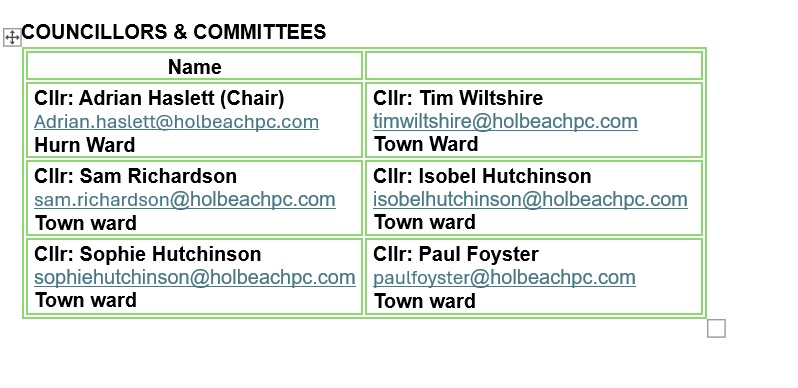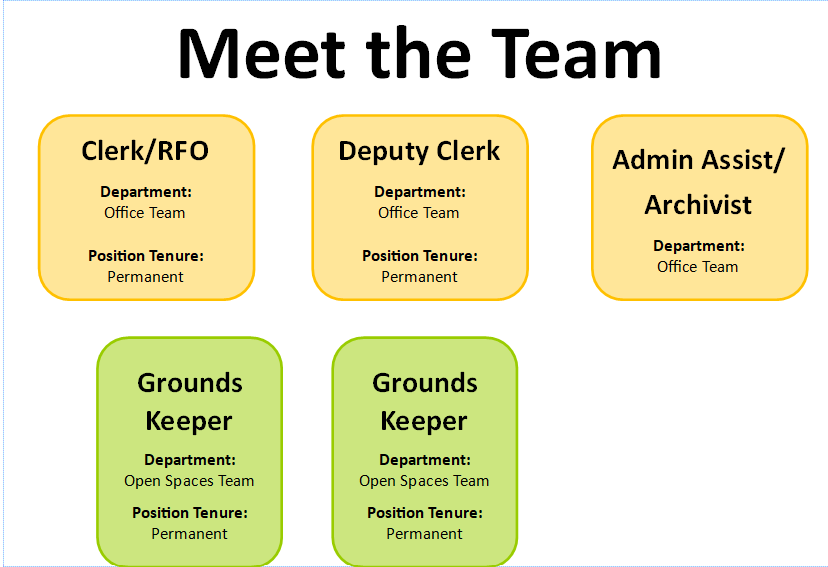Role of the Parish Council
The role of the Parish Council is to represent the interests of the whole community. The Parish Council is an elected body in the first tier of local government known as Local Councils. Other tiers, known as principal councils or Local Authorities, have many legal duties to deliver services such as education, housing, town and country planning, transport, environmental health and social services. Elections take place every 4 years with the next election in May 2027
Parish Councils provide a focus for the community to identify concerns and projects, and endeavour to solve them locally themselves. Parish Councils have the legal power to take action, but they have very few duties and greater freedom to choose what action to take. They can play a vital part in representing the interests of the communities they serve and improving the quality of life and the local environment.
Parish Council decisions are the responsibility of the whole body and are made collectively and by majority. The Parish Council has been granted powers by Parliament including the authority to raise money through taxation - the precept, and a range of powers to spend public money.
The Parish Council is a corporate body, and a legal entity, separate from that of its Members, and is accountable to the local community.
The Parish Council is an employer. The Parish Clerk works for and with the Council to action its decisions.
Role of a Parish Councillor
The principal role of a Parish Councillor is to take collective decisions of behalf of all residents within the Parish. Councillors must take great care to avoid taking decisions that take account of their own opinion only. They have a responsibility to be well-informed, especially about diverse local views and to listen to, and understand, the views and needs of different groups in the community. Councillors cannot assume that they represent the interests of electors without consulting them.
The role is unpaid, but Councillors are not volunteers in a legal sense. They are elected representatives and holders of a public office with statutory duties. Councillors serve for a 4-year term, unless co-opted or elected in a by-election, when they serve until the next election. They must apply the law and comply with the Code of Member Conduct. Councillors contribute to the work of the Council by suggesting ideas, influencing policy, engaging in constructive debate and by responding to the needs and views of the community. Councillors comment on proposals to ensure the best outcome and vote to enable the Council to make decisions.
Individual Parish Councillors cannot make decisions on behalf of the Council, but they can actively lead and engage with local projects. Parish Councillors have no powers outside of the Council meeting.
Diversity is encouraged. Councillors from different backgrounds better represent the whole community and possess different enthusiasms, skills, attitudes and interests. Some Councillors work with ideas while others are very practical; some like accounts while others prefer reports. The Parish Council needs a wide range of skills to work as a team.
Occasionally there will be a conflict of interest requiring sensitive judgement, and the need to take difficult decisions in an open, honest and reasoned way. Councillors are also required to act in an ethical way and to declare an interest when necessary.
Role of the Clerk
The Clerk is the Administrator and Responsible Financial Officer to the Council. The Clerk has the duty to summons Councillors to attend Council meetings and to ensure that all decisions taken by the Council are lawful, financially sound and accurately recorded. The Clerk executes all the decisions of the Council and also has some delegated functions. Jan Hearsey the Clerk can be contacted at clerk@holbeachpc.com Telephone 01406 426739.



